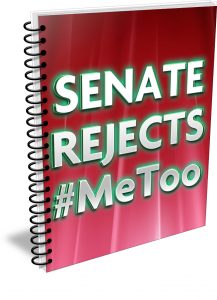Did The Senate Reject The MeToo Movement When It Voted Brett Kavanaugh In As A Supreme Court Justice?
The headline reads,
“Brett Kavanaugh Confirmed To Supreme Court As Senate Rejects Me Too Movement” (click to see Huffington Post Article).
Clearly this is a spin which pitches a false dichotomy. Either you support the #MeToo Movement by voting against Kavanaugh OR you reject the #MeToo movement by voting for Kavanaugh. This is a little nightmarishly amateur, but since we are in the process of learning about spins on this site, this seems a good place to start.
What Was Said:
The essential statement in the article that points back to the headline is, “Kavanaugh’s confirmation flies in the face of the cultural and political Me Too movement, which has empowered women in all walks of life to speak out about sexual assault and harassment, especially by men in positions of power.” The thought is that the Me Too Movement is a cultural/political movement that is empowering women to speak out. Of course,
 this is a good thing; in fact, it is a wonderful thing to see women speak out about abuse. The problem, hence the spin, occurs when speaking out is equated with infallibility. Just because someone speaks out or makes an assertion, why does that mean they are in the right?
this is a good thing; in fact, it is a wonderful thing to see women speak out about abuse. The problem, hence the spin, occurs when speaking out is equated with infallibility. Just because someone speaks out or makes an assertion, why does that mean they are in the right?
This leads us to how the spin uses a common logical fallacy.
The Fallacy: False Dilemma
A false Dilemma is accurately described as “When only two choices are presented yet more exist, or a spectrum of possible choices exists between two extremes. False dilemmas are usually characterized by “either this or that” language, but can also be characterized by omissions of choices.” [Click to see LogicallyFallacious]
The dilemma here is that one simply is
A. For Kavanaugh and against #MeToo
B. For #MeToo and against Kavanaugh
This means that there are no other options. You love me or hate me, help me or hurt me, cheer me or curse me.
THE GOAL: THINK PAST THE SPIN
When we think past the False Dilemma, we can quickly ask a fresh question, ” If the Senate had rejected Kavanaugh, would it then be a supporter of the #MeToo Movement? Of course, the jury would be out and we’d only be ‘the next vote’ away from a fresh accusation.
The reality is that accusations themselves are valid or invalid until they are proved or support to be so. The spin in this discussion presumes that an accusation is valid; however, for that to be true then the accusers must be incapable of deceit, deception, or confusion. Said differently, we must believe that any woman who makes an accusation is 100% honest and accurate.
If you care to read both sides of the issue, then you’ll find that there is no proof that supported Dr. Ford’s allegations to the level of a preponderance of the evidence, or even more likely than not. In the cycle of spin, you can see in the same article that the authors claim that, “Some argued that Ford’s contemporaries couldn’t corroborate her story, despite Ford securing affidavits from four people who said she previously told them about Kavanaugh’s alleged attack. “Of course, corroboration doesn’t mean that she told her story to other people at sometime in her life; but rather, that witnesses to the event, contemporary to the moment, actually support her claims. If you say you saw a space-alien when you were ten and got affidavits that proved you shared this information with others when you were 18, 24, 33, and 40— none of this would corroborate the space-alien event. For that to happen you need someone to say, “Yes, she came to me the next morning when she was ten years old and told me the whole story.”Dr. Ford could be completely right or completely deceived. Women should be supported in sharing instances of abuse (as too men). However, to accept carte blanche an accusation as true is untenable and self-defeating. Had Judge Kavanaugh accused her of stalking-and-attacking him, then why wouldn’t he be believed? The spin here is that there is a false choice; you either are pro or anti, for or against, so there is no middle possibility or option.But there are other options:
1. There was not enough evidence to come to a conclusion
2. The Senate could be pro-MeToo, but still require adequate proof
3.The MeToo Movement could be anti-Senate, anti-government, and so claim the same state of rejection, no matter what
4. You want #MeToo women to speak up and be listened to, but you don’t want anything accepted as ‘true’ without proof (see the horror of the Duke lacrosse team members accused of rape by Ms. Mangam, who lied and was eventually convicted of murder. See https://www.usatoday.com/story/sports/2013/11/22/crystal-mangum-duke-lacrosse-rape-accuser-guilty-murder/3680701/)
While there are other possibilities, these are sufficient to show that the spin in play was to remove all options from our thinking so that we too must conclude the MeToo Movement is flawless and the Senate is evil. This isn’t about facts exactly, but about how the authors are spinning the bits of data to make you conclude what they want you to conclude. Think for yourself.Finally, and not much mentioned in the media, the Senate’s approval of Kavanaugh itself came down to about four votes on this issue. Therefore, another spin in play is that the decision of a bare-majority dictates the conclusion (according to the HuffPo writers)) that the ‘Whole Senate’ is against the MeToo Movement.
Have we solved the issues surrounding the #MeToo Movement? No, not at all. However, here we are concern with the spin in the HuffPo article, not the weightiness of the issues involved.
See the HuffPo SPIN that the Senate as an entity has rejected the #MeToo Movement and move along.



Recent Comments